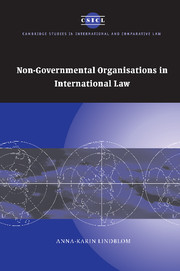Book contents
- Frontmatter
- Contents
- Acknowledgements
- List of abbreviations
- Part I Theoretical framework
- 1 The main issues and their context
- 2 Historical and conceptual background
- 3 International legal theory and non-state actors
- Part II Legal and empirical survey
- Part III Conclusion
- Bibliography
- Interviews
- Index
- CAMBRIDGE STUDIES IN INTERNATIONAL AND COMPARATIVE LAW
1 - The main issues and their context
Published online by Cambridge University Press: 12 August 2009
- Frontmatter
- Contents
- Acknowledgements
- List of abbreviations
- Part I Theoretical framework
- 1 The main issues and their context
- 2 Historical and conceptual background
- 3 International legal theory and non-state actors
- Part II Legal and empirical survey
- Part III Conclusion
- Bibliography
- Interviews
- Index
- CAMBRIDGE STUDIES IN INTERNATIONAL AND COMPARATIVE LAW
Summary
Introduction
My aim in this study is to investigate the present legal status of nongovernmental organisations (NGOs) in international law, and to discuss this status in relation to the functioning and legitimacy of the international legal system. The seemingly technical issue of international legal status is closely related to broader questions about participation and representation of different groups on the international plane and the legitimacy of international law. The overall perspective chosen here is therefore a systemic one, which sees questions about the role of NGOs as legal actors as issues of how international law functions, and ought to function, as a system. It should nevertheless be clarified at the outset that it is not asserted that NGOs are ‘good’. In fact, NGOs are neither good nor bad. This study concentrates on non-governmental organisation (without an ‘s’) as a form of association, rather than on particular organisations, and on the role of NGOs generally within the international legal context.
Part I contains the theoretical framework of the study. This first, introductory, chapter outlines the political and legal setting in which the study is placed. It deals with a number of basic characteristics of international law as well as international political developments and discusses issues of the legitimacy of international law and the role of NGOs in that context. The chapter also examines different definitions of ‘non-governmental organisation’ and specifies the term for the purpose of the investigation, along with the delimitations which have been necessary.
- Type
- Chapter
- Information
- Non-Governmental Organisations in International Law , pp. 3 - 52Publisher: Cambridge University PressPrint publication year: 2006

